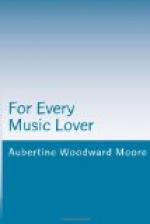Where music study becomes compulsory the blunder of permitting the compulsion to be felt must be avoided. Socrates of old, in Plato’s Republic, advised making early education a sort of amusement. Those who heed his counsel should not forget that in turning music study altogether into play work there is danger of weakening the will. The tottering footsteps should be guided wisely, as well as tenderly, in the first approach to the Temple of Art, that the pupil may learn to walk, as well as to observe and think independently. We most prize beauty that we are able to discern for ourselves. We gain strength by intelligently conquering our own problems and perplexities. “Nothing is impossible,” as Mirabeau has said, “for one who can will.”
The aim of music study is to know music, to gain a correct conception of how it should sound, and so, as far as possible, to make it sound. This aim can never be reached by the mere cultivation of technical adroitness. Untold sacrifices are made to-day to what becomes the unrighteous mammon of technique when the mechanical side of practice is exalted above its interpretative aspects. Schumann deemed brilliancy of execution only valuable when it served a higher purpose. That higher purpose is to reach and express the soul of music. Unless enriched by it, all mechanism is dead. It is not desirable that every one should perform acrobatic feats on some musical instrument, or indulge in vocal pyrotechnics, but it is desirable to extract music out of whatever technique may be attained. Instead of racing onward with feverish haste to ever increased technical skill at the expense of other development, it were well for the student to pause until each composition attacked, be it but an exercise, could be interpreted with accuracy, intelligence, and feeling. We should then have more musicianly players and singers. We should more often be brought under the magic spell of exquisitely shaded tone that may make a simple little melody alive with beauty.
[Illustration: Brahms]
A grave blunder of our present music study is the neglect of ensemble playing and singing. Some of the noblest music written is for part-singing and for two or more instruments. Much profit and delight will be the result of making its acquaintance. Four and eight hand piano arrangements of the great overtures and symphonies, too, are valuable and enjoyable. They prepare the way for an appreciation of an orchestral performance of these masterpieces, and broaden the musical horizon. Where there are several music students in a family it is a pity for them to confine their efforts exclusively to the piano, although every musician should have some knowledge of this household instrument. That is a happy home whose members are united by the playing or singing of noble concerted music.




